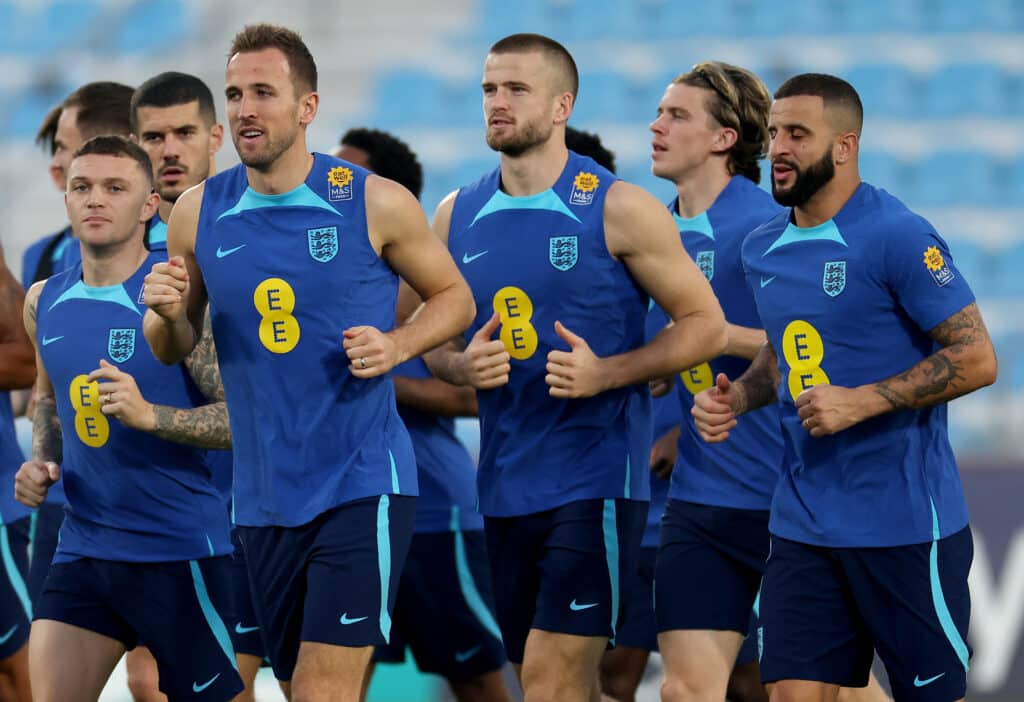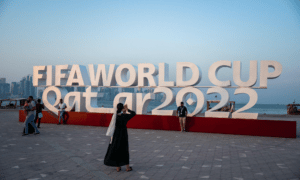Boycott Qatar? It’s not that simple: Gay football experts on difficult choice facing World Cup fans

LGBTQ+ football fans have experienced some hostility from officials in Qatar. (FIFA/Getty)
In the lead-up to the World Cup in Qatar, horrific reports of the abuse and persecution of LGBTQ+ Qataris have sparked calls for a boycott.
Debate around the country’s anti-LGBTQ+ laws and human rights abuses have intensified, with foreign secretary James Cleverly slammed for suggesting that fans should “compromise” on their sexuality while in the country, and ‘safe houses’ proposed for visiting queer fans.
Even football legend David Beckham has received huge push-back over his partnership with Qatar, while polling has found that due to Qatar’s record on LGBTQ+ rights, the majority of Brits now oppose the World Cup being held in the country.
So should LGBTQ+ football fans boycott the Qatar World Cup?
Adam Crafton will be visiting Doha, Qatar for the World Cup for work – he’s a journalist at sports publication The Athletic – with around 20 colleagues.
“It’s almost like there’s two World Cups going on,” he tells PinkNews. “On the one hand, there is a football tournament happening, and what is also happening is a major discussion around human rights abuses.”
Crafton says that as a “white journalist from a reasonably prominent publication” who will be “surrounded by colleagues”, he personally feels safe to visit Qatar despite its anti-LGBTQ+ laws (same-sex relations can result in up to seven years imprisonment, while the death penalty is possible for Muslim men).
“I think it’s improbable that I would personally face issues,” Crafton adds, caveating: “That doesn’t mean that that’s it’s going to be the same for supporters who might be going out who are in some ways more exposed, or for LGBT Qataris.”

An England training session at Al Wakrah Stadium in Doha, Qatar ahead of the World Cup (Lars Baron/Getty Images)
Crafton adds that if an England player or someone similarly high-profile were to boycott the World Cup, it would be an “incredible use of a platform”, but he isn’t convinced of the efficacy of an everyday fan doing the same.
Ultimately, individual boycotts are a “matter of personal principle”, he says, adding: “There’s been a huge lack of clarityfrom the Qatari state around the situation for LGBT people at this World Cup'”.
“They talk about it being inclusive and welcoming… but they very rarely use the acronym LGBT, they rarely refer directly to gay rights, they rarely go into specifics.
“So what does that mean in practice? And also how will the laws of the state be interpreted during the four week period?”
Crafton notes that The Athletic plans to cover LGBTQ+ rights, alleged abuses against migrant workers in Qatar, and the relationship between FIFA and Qatar during the World Cup, as well as the football.
He imagines the “most relevant conversation” to come out of the World Cup will be surrounding LGBTQ+ rights, but adds: “I also feel slightly uncomfortable the idea of a load of American and British journalists riding into the rescue of LGBT Qataris, as though we know how to fix all these problems.
“The reality is that the law is not going to change tomorrow, or in four weeks time.
“It’s about understanding what are the things that LGBT Qataris need to be heard on. The only way you can do that is by speaking to them.”

The decision to hold the World Cup in Qatar has proved massively controversial due to the country’s human rights record. (Getty)
What’s certain is that fans are divided – and some don’t feel comfortable even watching from home.
Jack Duncan, a founding member of LGBTQ+ rugby fan association Quins Pride, said that as a gay football fan, the World Cup being held in Qatar is “heartbreaking”.
“This makes two World Cups in a row where the hosts have been hostile to LGBTQ people (with the last being in Russia),” he tells PinkNews.
“It further entrenches my view, which is widely held among queer football fans, that FIFA don’t care about us… They say all the right things and roll out the rainbows once a year, but when it really matters – money comes first.”
He’s gone “back and forth” with the idea of a boycott.
“One the one-hand I’ve thought why should I deny myself watching a sport I love? Why should it be queer fans who suffer? Most importantly, I’ve wondered what the best course of action is to help LGBTQ Qataris themselves,” he says.
“Ultimately, I’m leaning towards a boycott, in the hope enough people vote with their remotes to cause material harm to viewing figures.”
Similarly to Crafton, Duncan believes international LGBTQ+ football fans will most likely be safe to attend the World Cup, but thinks the focus should be placed on the safety of queer Qataris.
“I think the authorities know it would be a PR disaster if a foreign fan was to be arrested or harmed during the tournament, so I imagine they will avoid such incidents,” he adds.
“But what happens to LGBTQ Qataris before, during and after the tournament? They don’t get a break from fear.”
“We will not travel to this #WorldCup", said @di_ceee of @3Lionspride. "We’re hearing robotic insistence that all will be welcome, but this is not matched with evidence and commitment that this will be true.”
— ILGA World (@ILGAWORLD) November 9, 2022
Pride in Football co-chair Joe White previously told PinkNews that while they had a ticket to the World Cup in Qatar, they ultimately decided not to attend due to safety concerns.
They were concerned security checks at the event would be divided along gender lines, which could be “difficult” for non-binary people like them, as well as for “trans women or anyone who doesn’t necessarily pass”.
White added that Pride in Football had been asking FIFA “for probably a year now” for assurances on how the security checks will be handled at the World Cup, and had received no answers.
Qatar’s ambassador to the UK has assured LGBTQ+ fans that “holding hands” will be fine at the event, but that they should be “mindful” of “public displays of affection”.
FIFA told PinkNews in a statement: “Qatar is committed to ensuring that everyone will be able to enjoy the tournament in a safe and welcoming environment, to building bridges of cultural understanding and to creating an inclusive experience for all participants and attendees, including members of the LGBTIQ+ community.”

